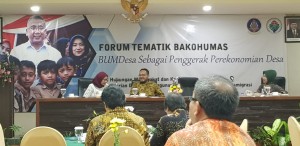Village-Owned Enterprises Expected to Boost Economy in Villages

Public Relations Coordinating Board Thematic Forum with theme BUMDes as Village Economic Driver at Savana Hotel and Convention, Malang, East Java, Wednesday (24/4). (Heni/PR)
Village-Owned Enterprises (BUMDes) whose business capital derive from community initiatives is possible to apply for loans capital to external parties or through third parties, Secretary General of Ministry of Village, Development of Disadvantaged Regions and Transmigration (PDTT) Anwar Sanusi has said.
This is in accordance with the law and regulations (Law Number 32 of 2014 on Regional Government), said Anwar while speaking at the Public Relations Coordinating Board (Bakohumas) Thematic Forum with theme, BUMDes as Village Economic Driver, in Savana Hotel and Convention, Malang, East Java, Wednesday (24/4).
The BUMDes, Anwar continued, can help communities throughout the country to gain full freedom to express themselves, to make ideas to realize dreams, and to hope for their own development.
Meanwhile, Head of Public Relations and Cooperation Bureau of the Ministry Bonivasius Prasetya Ichiarto, shared the same sentiment that BUMDes has a strategic role as economic driver in rural communities.
On the same occasion, Director of Governance and Partnership for Public Communication of Ministry of Communication and Informatics Selamatta Sembiring said that the establishment of BUMDes is one of the ways to develop disadvantaged regions to boost economic growth.
BUMDes are expected to become a key for economic growth to boost economy in the village in the future, Selamatta said.
He added that BUMDes have all aspects of empowerment, including economic empowerment, institutional development, human resources and managerial capacity empowerment, economic networks development, and the development of economy in downstream sector. (HEN/ES)
Translated by: Estu Widyamurti
Edited by: M. Ersan Pamungkas








